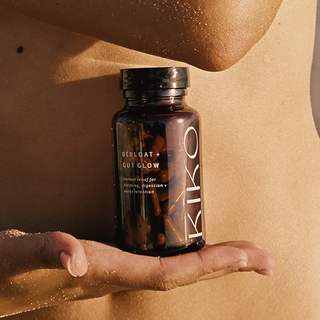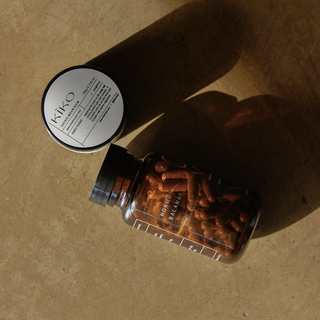
As the flowers begin to bloom and the world shakes off the last traces of winter, you may also feel the urge to freshen things up. Many people take advantage of the season to declutter their homes, but what about decluttering your gut? Just as your living space benefits from a spring clean, so does your digestive system. A healthier gut can lead to better digestion, improved nutrient absorption, and an overall sense of vitality.
Our gut is often called the body's second brain because it influences many aspects of our health. From digestion and nutrient absorption to immune function and even mental well-being, maintaining a healthy gut is crucial for overall health. Here are some tips to spring clean your gut and optimise digestion and nutrient absorption…
1. Eat Whole, Unprocessed Foods
The first step to gut health is cleaning up your diet. Processed foods, artificial additives, and excess sugar can disrupt the delicate balance of bacteria in your gut. Focus on incorporating whole, unprocessed foods such as fruits, vegetables, whole grains, nuts, and seeds into your meals. These foods are rich in fibre, vitamins, and minerals that nourish the gut microbiome and support digestion.
Fruits and vegetables, in particular, contain prebiotic fibres that feed the beneficial bacteria in your gut. Leafy greens, carrots, apples, and berries are excellent choices. When possible, choose organic produce to reduce your exposure to pesticides, which can harm gut health.
2. Incorporate Fermented Foods
Fermented foods are rich in probiotics, which are beneficial bacteria that promote a healthy gut microbiome. Including these foods in your diet can help replenish and diversify your gut flora, leading to improved digestion and nutrient absorption.
Yoghurt, kefir, sauerkraut, kimchi, miso, and kombucha are all excellent sources of probiotics. Aim to consume a variety of fermented foods to introduce different strains of beneficial bacteria into your gut. If you’re new to fermented foods, start slowly to give your digestive system time to adjust.
Tip: Add the Kiko Vitals Prebiotic + Probiotic to your daily routine to make getting all your beneficial bacteria as easy and convenient as possible!

3. Stay Hydrated
Water is essential for healthy digestion and nutrient absorption. It helps break down food so your body can absorb the nutrients. Additionally, staying hydrated supports the production of mucus in the stomach lining, which protects against stomach acid and allows for smooth digestion.
Aim to drink at least eight glasses of water a day, and more if you are active. Herbal teas, such as ginger, peppermint, or chamomile, can also support digestion and provide additional hydration. Avoid sugary drinks and excessive caffeine, which can irritate the gut.
4. Add Digestive Enzymes
Digestive enzymes help break down the food you eat so that your body can absorb the nutrients more efficiently. Your body naturally produces enzymes, but factors such as age, stress, and poor diet can reduce their effectiveness. Supplementing with digestive enzymes can help enhance digestion and prevent issues like bloating, gas, and indigestion.
You can find digestive enzymes in supplement form, or you can boost your natural enzyme production by eating enzyme-rich foods like pineapples (which contain bromelain), papayas (which contain papain), and fermented foods. Taking a digestive enzyme supplement before meals may help improve your digestive efficiency.
Did you know?
The Kiko Vitals Debloat + Gut Glow formula is powered by papaya, ginger, peppermint, and a host of other star digestive ingredients.

5. Practise Mindful Eating
It’s easy to rush through meals when life gets busy, but eating too quickly can interfere with digestion. When you eat mindfully, you give your body time to properly break down food and absorb nutrients.
To practise mindful eating, slow down, chew your food thoroughly, and savor each bite. This allows your stomach to signal to your brain when you’re full, helping to prevent overeating. Eating in a relaxed environment and focusing on your food without distractions can also improve digestion.
6. Get Moving
Exercise is not only beneficial for your cardiovascular health but also for your digestive system. Regular physical activity helps stimulate the muscles in your digestive tract, aiding in the smooth movement of food and waste through your intestines.
Incorporating moderate exercise like walking, yoga, or swimming into your routine can improve digestion and reduce bloating. Even a short walk after a meal can help with digestion by encouraging peristalsis, the wave-like contractions that move food through your digestive tract.
7. Prioritise Sleep and Stress Management
Your gut health is closely connected to your overall well-being, and stress and sleep play significant roles in this relationship. Chronic stress can lead to an imbalance in gut bacteria, while poor sleep can disrupt the body’s natural digestive processes.
Prioritise getting 7 - 9 hours of quality sleep each night to support gut health. Additionally, practice stress management techniques like meditation, deep breathing exercises, or yoga to help maintain a calm digestive system. Remember, your gut and brain are connected through the gut-brain axis, so reducing stress can positively impact your digestion.
8. Consider a Gentle Detox
A gentle gut detox can help reset your digestive system by eliminating toxins and allowing your gut to heal. Start by eliminating processed foods, sugar, alcohol, and caffeine for a few days. Instead, focus on consuming nutrient-dense, whole foods, and consider adding detoxifying ingredients like lemon, ginger, and turmeric to your diet.
Bone broth and herbal teas can also soothe and heal the gut lining, while a fiber-rich diet helps sweep toxins from the digestive tract. Keep in mind that detoxing doesn’t have to be extreme – small, consistent changes can yield big results.
Conclusion
Spring cleaning your gut is a holistic process that involves nourishing your body with whole foods, staying hydrated, managing stress, and adopting healthy habits that support digestion and nutrient absorption. By making these small yet impactful changes, you can revitalise your digestive health and set the stage for better overall well-being.



